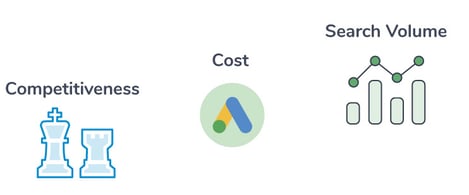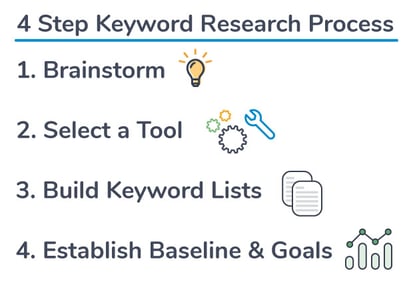What is Keyword Research? A Guide for Top Research Methods & Best Practices
While Google keeps us on our toes with all the algorithm updates they keep rollin' out, one thing has stayed pretty consistent for inbound marketers looking to optimize their websites for search: keyword research.
In this post, we’ll define what keyword research is, why it’s important, how to conduct your research for your SEO strategy, and choose the right keywords for your website.
What is SEO keyword research?
Keyword research is the process by which you research popular search terms people type into search engines like Google, and include them strategically in your content so that your content appears higher on a search engine results page (SERP). Keyword research is a fundamental practice in search engine optimization (SEO).
The process for how to do keyword research for SEO involves choosing a topic for your content that is focused on a set of targeted keywords that you want your content to rank for.
Why is keyword research important?
Keyword research helps you find which keywords are best to target and provides valuable insight into the queries that your target audience is actually searching on Google. The insight that you can get into these actual search terms can help inform content strategy as well as your larger marketing strategy.
People use keywords to find solutions when conducting research online. So if your content is successful in getting in front of our audience as they conduct searches, you stand to gain more traffic. Therefore, you should be targeting those searches.
In addition, in the inbound methodology, we don't create content around what we want to tell people; we should be creating content around what people want to discover. In other words, our audience is coming to us.
This all starts with keyword research.
For an inside look into how Arel="noopener" target="_blank" hrefs can aid you in your SEO keyword research, check out our case study and exclusive interview here.
Conducting keyword research has many benefits, the most popular reasons being:
Marketing Trend Insight
Conducting effective keyword research can provide you with insights into current marketing trends, and help you center your content on relevant topics and keywords your audience is in search of.
Traffic Growth
When you identify the best fitting keywords for the content you publish, the higher you'll rank in search engine results — the more traffic you’ll attract to your website.
Customer Acquisition
If your business has content that other business professionals are looking for, you can meet their needs and provide them with a call to action that will lead them into the buyer journey from the awareness stage to the point of purchase.
By researching keywords for their popularity, search volume, and general intent, you can tackle the questions that most people in your audience want answers to.
Keywords vs. Topics
More and more, we hear how much SEO has evolved over just the last 10 years, and how unimportant keywords themselves have become to our ability to rank well for the searches people make every day.
And to some extent, this is true, but in the eyes of an SEO professional it’s a different approach. Rather, it's the intent behind that keyword, and whether or not a piece of content solves for that intent (we'll talk more about intent in just a minute).
But that doesn't mean keyword research is an outdated process. Let me explain:
Keyword research tells you what topics people care about and, assuming you use the right SEO tool, how popular those topics actually are among your audience. The operative term here is topics — by researching keywords that are getting a high volume of searches per month, you can identify and sort your content into topics that you want to create content on. Then, you can use these topics to dictate which keywords you look for and Target.
How to Research Keywords for Your SEO Strategy
I'm going to lay out a keyword research process you can follow to help you come up with a list of terms you should be targeting. That way, you'll be able to establish and execute a strong keyword strategy that helps you get found for the search terms you actually care about.
What Do You Mean by Keyword Research?

Keyword research is a form of market research, but it’s more than that.
Each company begins with assumptions about its customers and their online behavior. SEO keyword research allows brands to check their assumptions against data to validate or challenge their strategy.
Keyword research with an SEO keyword research tool allows companies to evaluate:
- Keyword search volume. A good keyword tool provides precise monthly search volumes for each search term entered.
- Competitiveness/Difficulty. Learn how difficult it is to rank on a certain keyword based on the competitive landscape.
- Bidding cost. Keyword research tools should provide a range or average cost-per-click for brands to effectively budget for PPC campaigns.
In addition, a quality keyword research tool provides users with keyword suggestions, allowing them to explore related keyword phrases and questions that they may not have considered.
The best SEO tools will also allow global companies seeking localized data to return keyword data by country.
What Is the Keyword Research Process?

What is the best process for keyword research?
Basic keyword research can be completed in a few hours, but there should be an ongoing process to monitor keyword trends and create new lists as your business needs change.
Here are some basic steps to follow:
- Brainstorm. Before you start outside research, your team should brainstorm what keywords and phrases are most relevant to your audience on their customer journey. Try to stay away from industry jargon and instead use phrases that your audience would use.
- Select a keyword research tool. There are many SEO keyword tools on the market, from free to paid. For best keyword research results, look for a robust keyword tool. SEO tools like Mangools (try it free)will give you precise search volumes, analyze competitive URLs, and analyze attribution insights.
- Build keyword lists. Start with a keyword list that encompasses your broad keywords, topics, and brand name. Next, you may want to build secondary lists specific to a product or service line or a specific point in your marketing journey.
- Establish your baseline and set goals. Save your lists and document your ranking position to be able to show progress later. Set goals around keywords for which you want to rank higher.

No comments:
Post a Comment